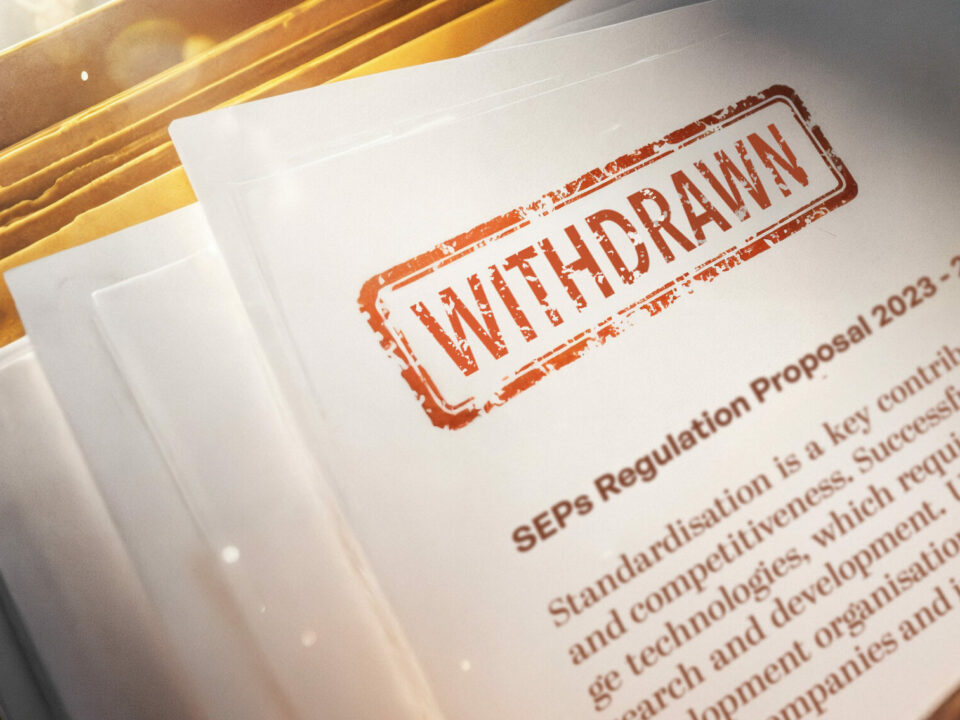FTC Commissioners stake out different positions regarding the availability of ITC exclusion orders for SEPs
FTC Chair Lina Khan and FTC Commissioner Rebecca Slaughter recently submitted comments regarding the public interest in an International Trade Commission (ITC) proceeding. Although they did not include an explicit disclaimer, this was their own opinion and not an opinion of the FTC itself. A recent speech by FTC Commissioner Christine Wilson makes it clear that there is disagreement within the FTC’s leadership on this issue.
Let’s provide a little context to fully understand the issues at play. The ITC is an agency which can enforce the patent laws by preventing the importation of infringing products. This is known as an ‘exclusion order’ and is akin to an injunction issued by U.S. District Courts. Unlike District Courts, the ITC cannot award damages, just exclusion orders.
In accordance with ITC procedures, various parties are allowed to submit public-interest statements about whether it is in the public interest to issue a remedy such as an exclusion order. Here Khan and Slaughter have taken the side of large patent implementers (digital platforms), and their proxies (ACT | The App Association), to argue that an exclusion order is not necessary because damages are an adequate remedy and are available in District Courts. Thus Khan and Slaughter argue, “As a general matter, exclusionary relief is incongruent and against the public interest where a court has been asked to resolve FRAND terms and can make the SEP holder whole.” They go on to note that when there are parallel District Court proceedings and that when “a District Court can make a complainant whole, both for past royalties with prejudgment interest and by establishing a future royalty rate, even a limited exclusion order is not in public interest.”
In the opinion of FTC Commissioner Christine Wilson, Chair Khan and Commissioner Slaughter are putting a thumb on the scale of justice in favour of implementers:
If the policy proposed by my colleagues on the Commission is followed, companies that implement patents can hang potential antitrust damages over patent holders, distorting the negotiating leverage between implementers and innovators in favour of implementers. The FTC should embrace a balanced approach that favours neither innovators nor implementers, but instead focuses on incentivizing competition and innovation.[1]
So, if a District Court can potentially make a patent holder whole, why exactly does Commissioner Wilson believe that barring an exclusion order favours implementers? Her reasoning is cogent and compelling.
Commissioner Wilson notes that even if a District Court finds an offer to be FRAND, it will not compel an implementer to accept that offer citing Judge Gilstrap in Ericsson v. Apple:
if Ericsson’s offer is found to be FRAND, then Apple may accept it and create a binding contract; Apple may reject it and not implement Ericsson’s patented technology; or Apple may reject the FRAND offer, implement Ericsson’s technology without the benefit of a license and subject itself to actions for infringement. The Court knows of nothing unique to the SEP scenario that alters these principles of black letter contract law.[2]
According to Wilson, this means that an implementer has no obligation to accept a FRAND license offer:
This ruling is noteworthy. According to this Order from Judge Gilstrap, even if a U.S. court finds that a SEP holder’s offer is FRAND, an implementer does not need to accept that offer and take a license. This ruling seems to provide support for innovators and commentators concerned about the ability of implementers to use lengthy negotiations and then litigation to advance a holdout strategy. A FRAND offer can be made, litigation can determine the offer is FRAND, and an implementer can still refuse to accept the offer.[3]
Thus, in Wilson’s opinion, the lack of an exclusionary order can lead to patent hold-out to the detriment of innovation:
Recall that Chair Khan and Commissioner Slaughter argued that an injunction at the ITC should be unavailable if “a court has been asked to resolve FRAND terms and can make the SEP holder whole.” In light of Judge Gilstrap’s ruling, one might be tempted to ask how long it will take for the SEP holder to be made whole, and to inquire about the consequences in the interim. This approach interferes with timely royalty payments, which fund future research and further innovation.[4]
Wilson further recognizes that precluding exclusion orders will favour deep pocketed implementers:
If the companies that engage in holdout are large companies like Apple that can fund ongoing litigation, then favouring implementers in FRAND disputes will help large companies over small competitors.[5]
Instead of favouring implementers by removing exclusion orders as a remedy, Commissioner Wilson believes that a balanced approach would be to follow the lead of the European Court of Justice in Huawei v. ZTE, which “provides a framework that imposes obligations on both innovators and implementers and addresses the injunction concern.”[6] Wilson goes on to note the salient principles of the Huawei v. ZTE decision:
Under this approach, the holder of a SEP does not violate antitrust law by requesting an injunction if, before bringing that action, the SEP holder: (1) alerts the alleged infringer of the infringement by designating the patent and specifying how it has been infringed; and (2) presents to that infringer a written offer for a license specifying the royalty and how it is calculated. The alleged infringer is obligated to respond in good faith to a SEP holder’s offer and (1) accept the offer; (2) make a FRAND counter-offer; or (3) provide appropriate security if its counter-offer is rejected. If a patent holder follows the framework, it can seek an injunction without risking antitrust liability. I believe this is a balanced approach that is more likely to facilitate both short-term competition and long-term innovation.
Thus, instead of creating some sort of per se rule banning exclusion orders, which invariably favours implementers, Wilson prefers an approach which spells out the obligations of both the SEP holder and the implementer. Such an approach is inherently more balanced.
[1] SEPs and FRAND at the FTC and ITC: Current Policy Proposals and Respect for IP Rights, Remarks for the “IP & Antitrust: Hot Issues” Conference Organized by Concurrences Review, Christine Wilson, Commissioner U.S. Federal Trade Commission, June 8, 2022. Available here.
[2] Order, Ericsson Inc. v. Apple Inc., No. 2:21-CV-00376-JRG at 1 (E.D. Tex. May 3, 2022).
[3] SEPs and FRAND at the FTC and ITC: Current Policy Proposals and Respect for IP Rights, at 8. Footnotes omitted from quoted language.
[4] Id at 8-9. Footnotes omitted from quoted language.
[5] Id. at 9.
[6] Id. at 10.



